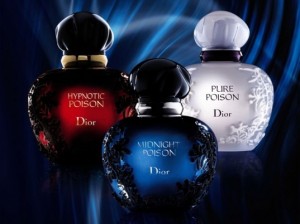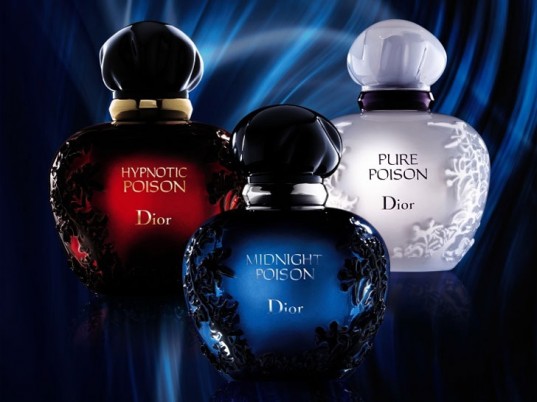 If you have ever been stuck in a car or a tight space with someone who’s wearing an overpowering perfume or cologne, you will probably understand what is meant by the term “second-hand fragrance pollution”. What you may find surprising is that you are not wrong to be upset by the overpowering smell, nor should you be reveling in the strong scents that you do like.
If you have ever been stuck in a car or a tight space with someone who’s wearing an overpowering perfume or cologne, you will probably understand what is meant by the term “second-hand fragrance pollution”. What you may find surprising is that you are not wrong to be upset by the overpowering smell, nor should you be reveling in the strong scents that you do like.
Because it turns out that your perfume could be toxic. In fact, anything with a strong smelling fragrance, be it lotion, shampoo, deodorant or aftershave, is full of unregulated chemicals and toxins.
Whether you are wearing the scent yourself or breathing it off of someone else, artificial fragrances are bad for you. They are linked to respiratory tract problems, allergies, hormone disruption and in some cases even cancer.
It may only be a smell – but the truth is it can hurt you, even if you are not the one wearing it!
What’s inside your perfume product?
When you purchase a personal care product that lists “fragrance” as an ingredient, you are buying something that contains any one (or more) of the 5000 stock chemical ingredients used by the fragrance industry. Most of these chemicals are tar or petroleum based. All of them are synthetic.
According to the Federal Fair Packaging and Labeling Act, cosmetics companies are to list all ingredients on their labels, except for those used to create the fragrance. Because of this the Campaign for Safe Cosmetics commissioned laboratory tests to analyse 17 bib-name fragrances. They found 38 chemicals in these which were not listed on the labels. The Average fragrance was found to contain 14 unlisted fragrance chemicals! Many of these are chemicals which are known to cause bodily harm, especially when built up in the body over time after frequent exposure through the skin or by breathing them in.
Common Ingredients in Perfume and Fragrance
Most fragrances are based on tar or petroleum and then manipulated with other chemicals until they smell like what you recognise as perfume. Some other common ingredients include:
Parabens: These preserve the scent. They are known to complicate normal hormone functions in both men and women.
Synthetic Musk: Also linked to hormone interference and disruption, synthetic musk accumulates in the human body over time and can be found in body fat, breast milk, and umbilical cord tissue. It also accumulates in the environment.
Phthalates: These are a synthetic preservative which are used to stop the fragrance from changing or becoming weaker over time. They are carcinogenic (cause cancer) and have been conclusively linked to all kinds of hormonal and reproductive issues, including low sperm count, early breast development, and birth defects. They are also known to cause liver and kidney damage.
With over 5000 chemicals used in the fragrance industry it is impossible to list them all here. Suffice to say that of those 5000 chemicals only 1300 have been evaluated, and even those have regulations imposed on them for their health risks.
It’s Only a Smell and it Will Hurt You
Any chemical that you can smell is already inside your body. To be able to have scent, a molecular structure must become airborne, enter the nose, and come in contact with scent receptor sites which allow us to perceive smell.
Many of these substances bypass the blood-brain barrier and enter your brain for identification. So if you are in a closed space with a strong smell you are absorbing the chemicals in it through your nose. Anyone who has ever seen an old film where someone is drugged with formaldehyde will know that absorbing chemicals through your nose does have an impact on your health. The same goes for smoke and other chemicals.
If you find that you used to be able to smell something (such as your laundry detergent) and now you can’t, it doesn’t mean that it isn’t harmful to you anymore. It just means that you have already absorbed so much that your brain is not bothering to register the smell anymore. Just like a smoker can no longer smell the cigarette smoke in their own clothing and furnishings.
Could Perfume be as big a problem as Second Hand Smoking?
In short, yes.
Fragrances are not regulated like tobacco smoke is, so whereas people can’t smoke in public places, they can sit right under your nose with as much perfume as they like. Perhaps you have someone in your office who wears perfume every day? Or maybe you have been wearing it yourself? The point is it’s hard to get away from, and a more delicate matter to deal with when trying to protect your own breathing space.
It’s not only perfume. It could be the smell of someone’s fabric softener or dryer sheets, their soap or shampoo. All of these are potentially toxic chemicals being released into the air for everyone to breath.
Many people suffer from allergic reactions because of this.
Alternatives to Fragrances and Perfume
A rose by any other name….
There are so many alternatives to using fragranced products! To start off with you can make sure you are buying your detergents, soaps and personal care products from a reputable organic and eco-friendly trader.
If you want to smell like roses, what better way to do that than by using actual roses? How? In the form of essential oils. Essential oils are simply the oil from real, organic products that have been pressed or distilled for their oils. The fragrances are actually stronger and more pleasing than synthetic fragrances. You will usually have to mix them with a bland carrier oil.
Alternatively, you can buy ready mixed body sprays and oils from reputable aromatherapy and essential oil stockists.
Not only are these scents natural and pleasing to the nose, many of them even have healing properties which can help with things like anxiety, headaches and stress.
Go to the next page and learn more about the immune boosting elixir to strengthen your body against these toxins.
About the Author:
Emma Deangela is the best selling author of The Alkaline Diet Program and 80/20 Fat Loss. She has helped over tens of thousands of men and women to lose weight and transform their health with sound nutrition advice. Is your blood acidic? Watch this video presentation and find out how to alkalize your body..
Which wonderful friends in your life are moving to a new home or renovating their house? Warn them about these toxic chemicals in perfume by sharing this article with them.
Share this eye-opening article using any of the social media and email buttons below.


Leave a Reply